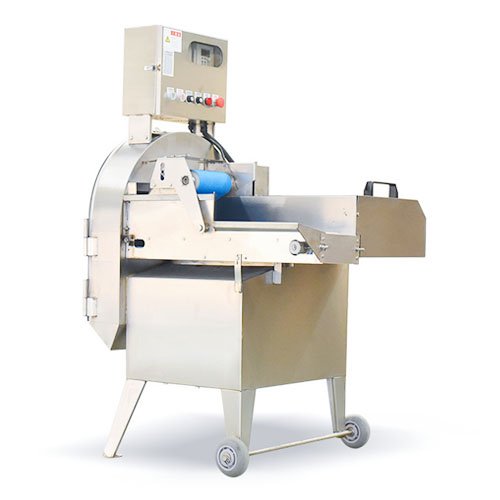
In today’s fast-paced commercial food industry, efficiency and consistency are paramount. Whether you’re managing a central kitchen, catering service, school cafeteria, or food processing facility, the way you prepare vegetables can significantly impact your operation’s productivity and food quality. Let’s explore how industrial vegetable choppers are changing the game for food service professionals.
Meeting the Demands of High-Volume Food Production
Commercial kitchens face unique challenges when it comes to vegetable preparation. Manually chopping hundreds of pounds of vegetables is not only time-consuming but also leads to inconsistent results and potential safety hazards for staff.
Industrial vegetable choppers address these challenges head-on. These powerful machines can process between 800 to 1500 kilograms of vegetables per hour – a volume that would require several staff members working continuously if done manually. This dramatic increase in processing capacity allows kitchens to:
- Prepare ingredients for thousands of meals in a fraction of the time
- Redirect staff to other value-adding activities
- Maintain consistent production schedules even during peak demand
Versatility That Meets Every Culinary Need
Modern commercial vegetable choppers aren’t one-trick ponies. They offer remarkable versatility with multiple cutting options including:
- Precise slicing for even cooking and attractive presentation
- Uniform shredding for salads and garnishes
- Clean strips for stir-fries and specialty dishes
- Perfect cubes for soups and stews
- Consistent dicing for salsas and mixed ingredients
This versatility allows food service operations to maintain consistent quality across different menu items while using a single piece of equipment. The ability to quickly switch between cutting styles also enables kitchens to respond rapidly to changing menu requirements or special orders.
The Leafy Vegetable Challenge Solved
Leafy vegetables present unique challenges in commercial food preparation. Their delicate structure makes them difficult to process efficiently while maintaining quality. Industrial vegetable choppers excel specifically at handling:
- Cabbage for coleslaw and stir-fries
- Celery for soups and salads
- Chinese cabbage for Asian cuisine
- Spinach for nutritious side dishes
- Green onions for garnishes
- Garlic for flavor bases
- Various gourds for specialty dishes
The precision cutting mechanisms ensure these vegetables maintain their texture and nutritional value while being processed at high volumes.
Built for Commercial Durability
The demanding environment of commercial kitchens requires equipment that can withstand continuous use. Quality vegetable choppers feature:
- Food-grade stainless steel construction that resists corrosion
- Premium imported cutting blades that maintain sharpness
- Variable frequency control systems for consistent operation
- Robust engineering designed for years of reliable service
These durability features translate to lower maintenance costs and fewer operational disruptions – critical factors for any food service business.
Streamlining Kitchen Workflows
Beyond raw processing power, industrial vegetable choppers transform kitchen workflows in several important ways:
Time Savings
What once took hours of manual labor can now be accomplished in minutes. This time efficiency allows kitchens to:
- Prepare fresh ingredients closer to service time
- Respond more quickly to unexpected demand
- Process ingredients in smaller batches for maximum freshness
Labor Optimization
With less staff time dedicated to basic vegetable preparation:
- Skilled culinary professionals can focus on more complex tasks
- Labor costs can be better controlled
- Workplace injuries related to repetitive cutting tasks are reduced
Consistency Improvements
Every slice, dice, and shred is uniform, ensuring:
- Even cooking times across all ingredients
- Consistent portion control
- Professional presentation standards
Real-World Applications
The versatility of industrial vegetable choppers makes them valuable across numerous food service settings:
Central Kitchens
Operations preparing meals for multiple locations benefit from the high-volume capacity, ensuring all satellite locations receive consistent ingredients.
School and Institutional Cafeterias
Educational institutions serving hundreds or thousands of meals daily can efficiently incorporate fresh vegetables into their menus while maintaining strict budgets and schedules.
Catering Services
Caterers can quickly adapt to different event requirements, processing vegetables for anything from small corporate lunches to large wedding receptions.
Food Processing Facilities
Businesses producing pre-packaged salads, meal kits, or ready-to-cook ingredients can maintain quality standards while meeting production targets.
Military and Large-Scale Dining Facilities
Operations feeding large numbers of people on strict schedules benefit from the reliability and efficiency these machines provide.
Practical Considerations for Implementation
Integrating an industrial vegetable chopper into your operation requires some planning:
Space Requirements
While powerful, modern vegetable choppers are designed with space efficiency in mind, typically requiring less than one square meter of floor space.
Training Needs
Most units feature intuitive controls that staff can master quickly, minimizing training time and ensuring safe operation.
Cleaning and Maintenance
Look for models with easy-to-clean designs that can be quickly sanitized between different vegetables or at the end of service periods.
Return on Investment
When evaluating the investment, consider not just the upfront cost but the ongoing labor savings, reduced food waste, and increased production capacity.
Conclusion
Industrial vegetable choppers represent a significant advancement for commercial food preparation. By dramatically increasing processing capacity while ensuring consistent quality, these machines help food service operations meet the growing demands for fresh, well-prepared vegetables across all types of cuisines.
For operations looking to improve efficiency, maintain quality, and optimize their kitchen workflows, a commercial-grade vegetable chopper isn’t just a luxury – it’s an essential tool that pays dividends in productivity and food quality day after day.

